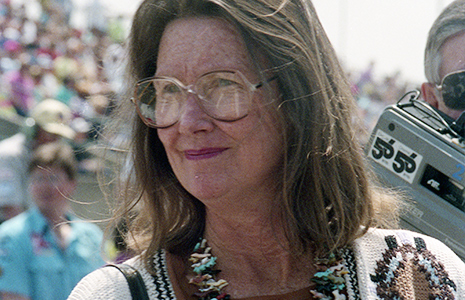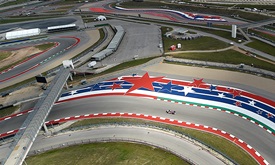A life well lived, and well worth remembering
NOV 13, 2018
Three days after Mari Hulman George died, Florida voted to end dog racing. Unlike most other outcomes in the state’s elections, it wasn’t close. Nearly 70 percent of voters said no, and dog tracks in the state will shutter at the end of 2020, meaning hundreds of greyhounds will be available for adoption in the months to come.
One of Mari’s many philanthropic endeavors – and one she held closest to her heart – was the rescue of retired racing greyhounds. It was just one of her passions; she devoted herself to other causes, including the study and care of horses, Special Olympics and Alzheimer’s research. But rescuing greyhounds was a hands-on cause for her.
By now, the life story of Mari Hulman George has reached people who don’t follow motorsports, stories of her gentle yet enthusiastic leadership of Indianapolis Motor Speedway, of growing up immersed in racing, of supporting it tirelessly, of befriending its participants and its fans, and her countless charitable causes.
 The only child of Anton “Tony” Hulman Jr. and Mary Fendrich Hulman, Mari was 11 years old when her father bought Indianapolis Motor Speedway. At the time, the facility had been idle for four years during World War II, overgrown with weeds and decay, and headed toward demolition. It was unclear whether the track and its Indianapolis 500 could recover from the layoff. Through tenacious persistence and help from a post-war boom, Tony Hulman made it work.
The only child of Anton “Tony” Hulman Jr. and Mary Fendrich Hulman, Mari was 11 years old when her father bought Indianapolis Motor Speedway. At the time, the facility had been idle for four years during World War II, overgrown with weeds and decay, and headed toward demolition. It was unclear whether the track and its Indianapolis 500 could recover from the layoff. Through tenacious persistence and help from a post-war boom, Tony Hulman made it work.
At the same time, his daughter became fascinated by auto racing. By the time she was 21, Mari was a pioneer, one of the first female co-owners of a race team. With Roger Wolcott, she formed HOW, which fielded sprint and champ cars for a number of drivers, including Tony Bettenhausen, Eddie Sachs, Roger McCluskey and Elmer George.
When she married George in 1957, he won the Midwest Sprint Car championship, including a 100-mile race at the New York State Fairgrounds in Syracuse. A few years later, A.J. Foyt stepped in as a relief driver for George in the Indy 500.
A few blocks from IMS is a brick ranch home, like other brick ranch homes built in the late 1950s and early ‘60s in Speedway, Indiana. Owned by Elmer and Mari, the house was a frequent residence for one of the sport’s rising young stars and future legends.
“We spent a lot of time together,” A.J. Foyt said of Mari and Elmer. “When I was coming up through the ranks, we lived with them two or three summers. We’ve been close for over 60 years. We spent many a Christmas together. Our kids are about the same age, so we had a lot of wonderful times together.”
Foyt isn’t alone in honoring Mari, who served as IMS chairman of the board from 1988 to 2016. Many of the public tributes mention her philanthropic work with animals, particularly her devotion to the rescue and care of retired greyhounds. At one event to raise money for the cause, she unfurled a banner that read, “Race cars, not dogs.”
“Our mother was such a unique, wonderful person,” IMS chairman Tony George said in a statement released by the track. “She loved her family, friends, auto racing and animals with equal passion. She was a quiet pioneer in so many ways, from owning a race team in the 1950s and 1960s to overseeing a period of tremendous growth and evolution while chairman of the board at IMS. She was known by millions as the woman who gave the command to start engines for the Indianapolis 500 and other events at the speedway, but her true legacy will be the generous and kind philanthropy she learned from her parents. That compassion and desire to help people and animals every day are the true hallmarks of her incredible life.”
Among the accolades on social media:
I didn’t know Mari Hulman George but you don’t have to know someone to admire and respect what they have done, I remember staying at the hotel at the Speedway and seeing all the greyhounds she had rescued, she will be dearly missed! RIP
— Darrell Waltrip (@AllWaltrip) November 3, 2018
So sad to hear that Mari Hulman George has passed. It marks the end of an era that so many of us are grateful to have been part of. #RIPBelovedMari
— Mario Andretti (@MarioAndretti) November 3, 2018
Racing is filled with passionate people, but you'd be hard pressed to find anyone more passionate than Mari Hulman George. She did so much for motorsports and her community. My heart goes out to the entire Hulman-George family. https://t.co/eWBT492nPl
— Tony Stewart (@TonyStewart) November 3, 2018
At the end of her funeral service last week in Terre Haute, Indiana, an Indianapolis Metropolitan Police Department officer sang the words that moved Mari Hulman George to tears nearly every time her dear friend Jim Nabors sang it before the start of the Indy 500.
The version of "Back Home Again in Indiana" that’s so familiar to race fans includes only two choruses. The rarely heard opening verse is particularly fitting for someone whose life was devoted to many causes drawn together by a specific place and time:
I have always been a wanderer
Over land and sea
Yet a moonbeam on the water
Casts a spell o'er me
A vision fair I see
Again I seem to be
Back home again in Indiana.



















